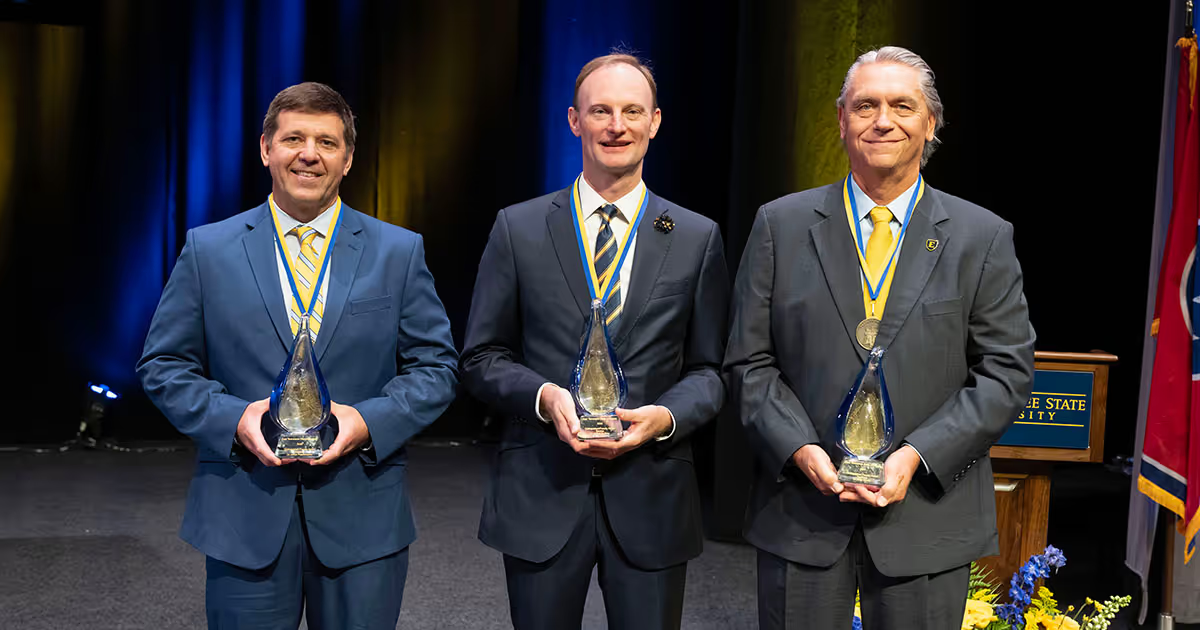At the annual Faculty Convocation ceremony, three East Tennessee State University faculty members were presented with the Distinguished Faculty Award in the areas of teaching, research and service. This award is the highest honor given to an ETSU professor.
Each honoree receives a one-of-a-kind, hand-blown glass piece and a $7,500 honorarium provided by the ETSU Foundation.
“These outstanding faculty members truly represent the heart of ETSU and our mission,” said Dr. Kimberly D. McCorkle, provost and senior vice president for Academic Affairs. “Their unwavering commitment to teaching, research and service drives student success and makes a meaningful impact on our region and beyond.”
Recognized for his exceptional contributions in the field of hypertension and chronic kidney disease, the Distinguished Faculty Award in Research was presented to Dr. Aaron Polichnowski.
Polichnowski is an associate professor in the Quillen College of Medicine Department of Biomedical Sciences. To date, Polichnowski has secured approximately $2 million in extramural funding for his research from the National Institutes of Health, American Heart Association and American Society of Nephrology.
“Dr. Polichnowski’s research has made significant strides in understanding the renal hemodynamic mechanisms that drive the transition from acute kidney injury (AKI) to chronic kidney disease (CKD),” his nominator wrote. “His work focuses on the impairments in renal autoregulation and the progression of the disease. Additionally, he has uncovered new insights into genetic factors that may contribute to CKD development.”
Polichnowski is praised for his deep commitment to mentoring the next generation of scientists. He has guided over 35 undergraduate, graduate and medical students, as well as professional scientists in their early careers at ETSU and other institutions. Since 2017, he has directed ETSU’s Medical Student Summer Research Program.
Dr. Jeff Gray, a professor in the Department of Pharmacy Practice in Bill Gatton College of Pharmacy, won the Distinguished Faculty Award in Service. He has spent 16 years building collaborative partnerships that strengthen communities across the region.
Among his many service initiatives, Gray is especially known for the drug take-back operation he helped establish in 2009. This collective effort brings together law enforcement agencies, local coalitions, students, educators, community members and policymakers to provide a critical medication disposal service in the community.
Gray has also served as the founding chair of the Community and Rural Initiative, as the long-time director of Gatton College of Pharmacy’s Continuing Education Program and as the National Community Pharmacists Association student chapter faculty adviser for 16 years.
“Dr. Gray has not only expanded access to professional education across the region, but he has also elevated the standard of care delivered by providers by ensuring that pharmacists, physicians and other clinicians are equipped with current, evidence-based knowledge with which to serve better the health needs of their communities,” wrote a nominator.
The Distinguished Faculty Award in Teaching was presented to Dr. Mike Stoots, professor in the College of Public Health’s Department of Community and Behavioral Health.
Stoots has earned multiple national and state-level honors recognizing his impact, including the 2025 Teaching Excellence Award from the Association of Schools and Programs of Public Health (ASPPH) earlier this year.
He also played a role in the ETSU College of Public Health securing the ASPPH’s Harrison C. Spencer Award for Community Service in 2024 and received the ASPPH’s Delta Omega Award for Innovative Curriculum in 2017 for his pioneering work with Project EARTH.
In his nomination packet, colleagues and students celebrated Stoots’ unique and student-focused approach to education.
“(Dr. Stoots) creates unique environments that break the traditional classroom mold and introduces opportunities for students to ask difficult questions and go beyond concepts discussed in class with practical applications,” wrote one former student. “In his classrooms, failure is not only permitted, but encouraged, so that we may explore innovative and creative approaches to complex health problems and build resilience when we do not find success immediately.”



.jpg)

